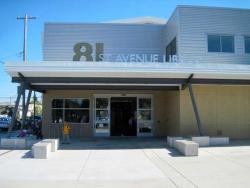 March 4, 2013
March 4, 2013
By Serena Valdez
Stacey Smith is an Oakland school district parent and volunteer who has served on the District GATE Advisory Committee, the school board’s Special Committee on School Based Management, and the Community Advisory Committee for Special Education. What she writes about does not reflect the view of any group.
You may have caught the recent news about street violence near New Highland Academy. On January 10th, teachers and children were preparing to leave on their regular visit to the nearby 81st Avenue Public Library branch when gunfire broke out and about sixty shots were fired. After this traumatic incident, visits to the library ended completely because it was considered too dangerous. The Oakland Tribune’s Tammerlin Drummond wrote a column about the incident and the police-escorted “peace march” to the library a couple of weeks ago that the teachers and the Lincoln Child Center helped organize to create some closure for the second- and third-graders. The march was widely covered and news reports focused on violence the children experience daily both in and near school and at home. Many touched on the trauma counseling the students received and teachers spoke of the great need to support the children. But something seemed missing to me.
Who is helping the teachers and school site staff with their own trauma?
I tracked down Susan Andrien, MFT, who is a Program Manager at the Lincoln Child Center. She told me that her organization has both full-time and part-time staff working on-site at both New Highland Academy and RISE. Both school communities experience high levels of violence including while at school. Last year there were nineteen lockdowns at RISE and as one New Highland Academy teacher mentions in Drummond’s column, the school actually has color codes that indicate the severity of the frequent lockdowns. One teacher shared how the staff was “profoundly impacted” by their situation. The need for student mental health services in these schools is well beyond the available capacity. And for teachers, there is even less support.
“They’re holding so much,” Ms. Andrien says of the teachers. “They’re doing the best they can to manage it and many of them are traumatized themselves, from what they see or hear from the students and from experiencing the violence themselves. They’re doing a great job but they need more support.”
Ms. Andrien discussed the very real consequences of the trauma for adults, like Post-Traumatic Stress Disorder (PTSD). And a quick internet search confirmed there are many other effects: greater risk for depression, substance abuse, general anxiety, and stress that gets in the way of healthy living. I wonder how many teachers and site staff are affected to the point that work and home life are impacted. My heart goes out to these folks, people who have taken on the difficult job of teaching plus the added challenge of navigating dangerous workplace environments to do their jobs.
The good news is that there is some recognition that the adults need mental health support too. Ms. Andrien told me that in addition to the work Lincoln Child Center is doing to provide some coaching and support to teachers and principals, the Oakland Unified School District is looking at a mental health support model that grew out of 9/11 and the lessons learned from treating the mental health needs of responders in New York City. I’m going to look into this and hope I have something to report on in the near future.
The bad news is that it sounds like any substantial plan to provide support for school staff who experience violence is still only in the planning stages. In the meantime, we have a lot of teachers and other site staff out there who continue to be exposed to violence every day and who may not be getting the support they need to cope with the issue. As one teacher confessed, “I worry that the District will lose many great educators if their fears aren’t addressed.”
Of course, violence and its related trauma are not limited to these two schools. Are you a teacher or staff member facing this problem at New Highland Academy, RISE or another site? How does the violence affect you and your colleagues? Are you getting the support you need and, if not, what do you think would help?
